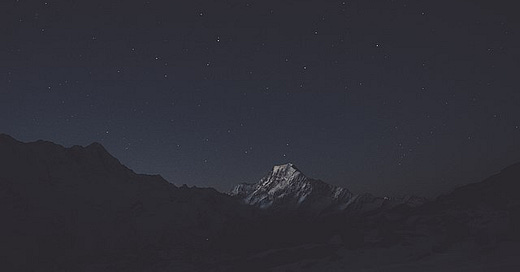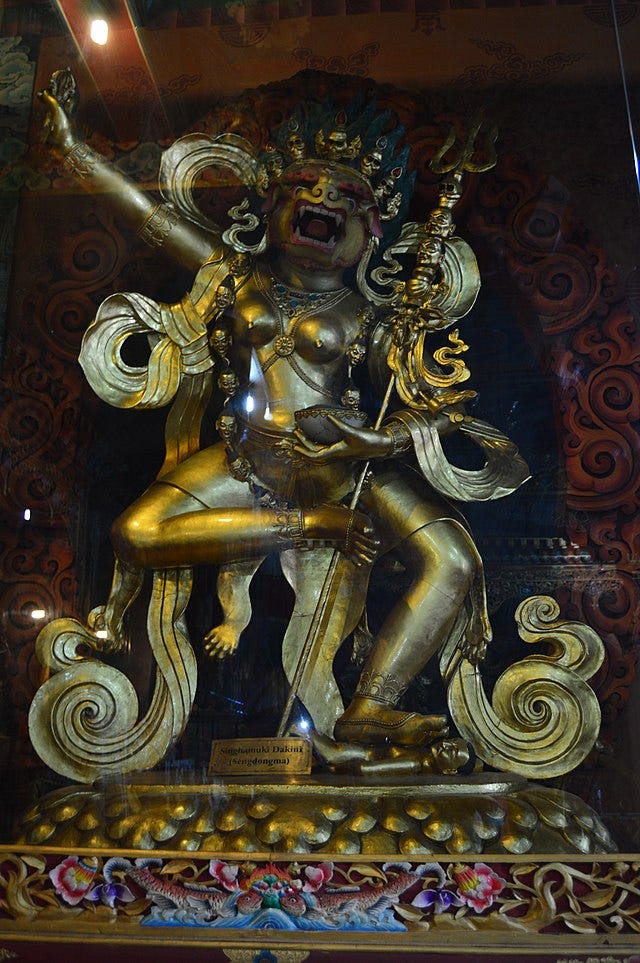With Brother Matthias and a group of the Khampa riders, Lapin and I waited, crouching under the cold starlight in a cleft of the rock, out of the night wind, a tiny fire of yak dung kindled in front of us. We were at the head of that steep ravine above the Matthiaskloster that, in the height of the summer, courses with snow-melt, providing the Kloster’s fresh water and forming one of the tributaries of Ab Almyah, the “Father of Waters”, the sacred river of Bassanda’s central highlands.[1] With us also was the Iliot shaman Tenzing Badr, the Lama who was a Dharma-brother of Brother Matthias, the Dharma-teacher of Madame Algeria, and who spoke on behalf of the Iliot shamans and people of the high hills as we gathered allies to resist the Cossacks. Having recited a mantra to Siddharajni, the daikini (patron saint) of the Three Brothers mountain range, he sat a little apart from us, his legs crossed underneath his robes, the beads of his mala moving through his gnarled fingers as he prayed; he seemed oblivious to the cold. I looked a question at Matthias; still looking at the shaman, he replied quietly, “He prays for those whose death he perceives to be approaching.” In response—though I am not a praying man—I sent a silent, nondenominational intention outward into the universe, hoping that Colonel Torres’s party might not be among those who would die.
Waiting in silence, glad of the windbreak but shivering under the cold moon nevertheless, I thought back to the previous morning’s hasty briefing, in the great room of the Mountain Rest, before the Colonel’s search party departed in pursuit of the raiders who were thought to have taken our friends. Myself and Cécile had mostly listened while Matthias and the Colonel and Madame Algeria conversed, though they made it clear that our recent experiences and narrow escapes on the Train Ride provided essential context. Yet Cécile’s manner had been remote and icy-cold, withdrawn and uncommunicative.
Brother Mathias had leaned forward, massive forearms folded on the bar of his Mountain Guest House, his eyes veiled and thoughtful as they spoke of the Peaks. They had talked of the Three Brothers—Fi Talat Ixwan in the old legend—and of the “eldest,” the tallest: Annolungma, the Magic Peak, and of the passes in between. He warned the Colonel, “If you seek the raiders, and your friends, over the northwestern passes, be careful and do not split up your riders. It doesn’t matter what season it is—the Mountains’ forces are always at play.”
Within the hour, the pursuers rode out, and I had seen Cécile, standing on the terrace outside the Mountain Rest, watch them until they had dwindled to black dots against the snowfields. Even after they had disappeared from sight, she remained on the terrace looking after them, like a stone image.
There was a soft hiss, seemingly from every direction at once out of the softly-blowing snow, and I came back with a start to my present surroundings. Lhakpa hefted his carbine, as after a moment a high-pitched voice came from the snow-cliff above us:
Bhā’i Mathīsa, kē tapā’īnlē bōlnu bha’ēkō hō?[2]
Matthias in turn looked up into the luminescent dark up-slope, and answered in the same language:
Hō, bhā’iharū, yī sāthīharū hō jasalē hāmrō sahāyatā cāhincha.[3]
There was a silence, enhanced rather than broken by the hissing susurrus of drifting snow. At a momentary break in the wind’s voice, I heard a muttering of speech from above us. Brother Matthias met my eye and shook his head, to indicate that we should not move. The Khampas, crouched around us in an outward-facing defensive circle, carbines at the ready, were silent and alert. I noticed the deadly Bowie knife, a gift from the Colonel, which glittered motionless in Cécile’s hand under the cold moonlight.
There came another whisper of snow, the faintest sound of movement, and then without any additional sound or warning three humanoids slid down off the ledge above us.
They were small statured, dark-skinned, and hirsute. They were bowlegged and long-armed, bundled and hooded in skins and furs against the cold. They squatted at a distance, barefoot in the snow, staring at us without speaking. Matthias held out his open hand, palm up.
Namaskāra, bhā’iharū. Hāmī tapā’īṅkō jñāna ra maddata khōjna ā’um̐chauṁ.[4]
After a moment, the tallest of the three rose to a crouch, reached out a long arm, and laid his palm gently against Matthias’s own.
Ma Arbō hum̐. Hāmī kastō sahayōga dina sakchauṁ, bhā’i?[5]
We listened—or so I presumed Cécile to be listening, for despite the weapon in her hand, her manner remained cold and remote—as Matthias, with occasional assistance from Lhakpa, explained to the snow-men that our friends had been taken by the Vidēśīharū who came from the foreign places beyond the northern mountains. He explained further that the Colonel, who they knew, was even now among those mounting a rescue. He concluded by saying, “And that is why we come to you, Bhā’iharū. With the Colonel gone, and with only those comrades who you see before you, we are still too few, and there are too many ways the ferengi could escape, taking our friends with them, to torture and death. Can you help us in this search?”
There was a silence, though I had the sense that the snow-men were somehow conferring without words amongst themselves. Then Arbō’s two companions grunted and nodded.
The Parvatamā leader looked at Matthias. “You we will help. The monks and shamans have been kind to us in the high snow valleys. These foreigners from the north are not good people. They hunt us with guns and they harm us. We will help you find your friends, and we will fight beside you, against them.”
He stared into the fire, though he spoke to Matthias.
“But not alongside these who ride with you. These are not our friends.”
Lhakpa glared but kept silent. Arbō continued to stare into the fire, as if oblivious to that glare. Matthias looked from one to the other.
Yet it was one of Brother’s great attributes that he understood the value, at times, of simply awaiting clarity: of resisting the temptation to force resolutions. I hunched forward to touch his elbow: after a moment, he turned to look at me. Silently, I mouthed “Why?” He shook his head, looking back at the two headmen, who sat cross-legged and immobile across from one another.
After another moment, Brother nodded to himself and spoke, in a conversational tone, as though he and I were alone.
“The Parvatamā can track but Khampas don’t trust ‘em—they refuse to be led by them. Parva have had bad experiences with the Khampas, going back centuries, and Lhakpa knows that. Parva can find our friends, but it’s only with Lhakpa’s riders that we can find them in time.”
I shook my head in bewilderment. “Then—there are no options? Neither can be persuaded to make common cause with the other?”
Matthias did not respond but continued to look at the two headmen. No one moved.
And then Cécile, who had remained silent and remote, suddenly turned her head and spoke.
“I will lead them. I will ride with Lhakpa and together we will trust Arbō’s wisdom.”
Again, the conversation ceased. I heard Tenzing Badr’s continued quiet recitation of verses from the Bassandayana.
Arbō looked at the huge knife Cécile still held in her hand. But he spoke directly to Lhakpa, at some length, for the first time. And, for the first time, the man of the snows smiled.
[Lapin picks up the account]
Matthias leaned over to Lhakpa, asking a question in Tibetan. Lhakpa ducked his head, and then grinned, and cut his eyes toward me, before asking a question of Matthias, who nodded, and said, in English, “Go ahead, Brother.”
I looked my question at Lhakpa; after a moment, he said, in his heavily-accented Russian, “Mahilā Kharagōśa, the hairy men have seen your warrior spirit in defense of the Dharma, and they compliment you, and they call you the daikini Simhamukha.”
Matthias himself chuckled, and added, “Lhakpa would apologize for his own and the Parva’s incomplete understanding. He says that sometimes Dharma insights are simple because they’re so simply correct. Arbō believes that if you need to raise a wrathful aspect in order to do what needs to be done, then even the Buddha says a Bodhisattva can take on bad karma in order to prevent worse suffering. He says, Daikini, that they will both go, with their brethren, and that they will trust one another, under your leadership.”
[1] Ab Almyah is the great river of northern Bassanda, central to Iliot shamanic teachings, and believed to carry baraka (“blessedness”/”energy”) from the Rift Portal at the top of the Annolungma Range of mountains.
[2] “Brother Mathias, is this the one you spoke of?”
[3] “Yes, brothers, these are the Friends who require our aid.”
[4] “Greetings, Brothers. We come to seek your knowledge and your help.”
[5] “What aid can we give, Brother?”






